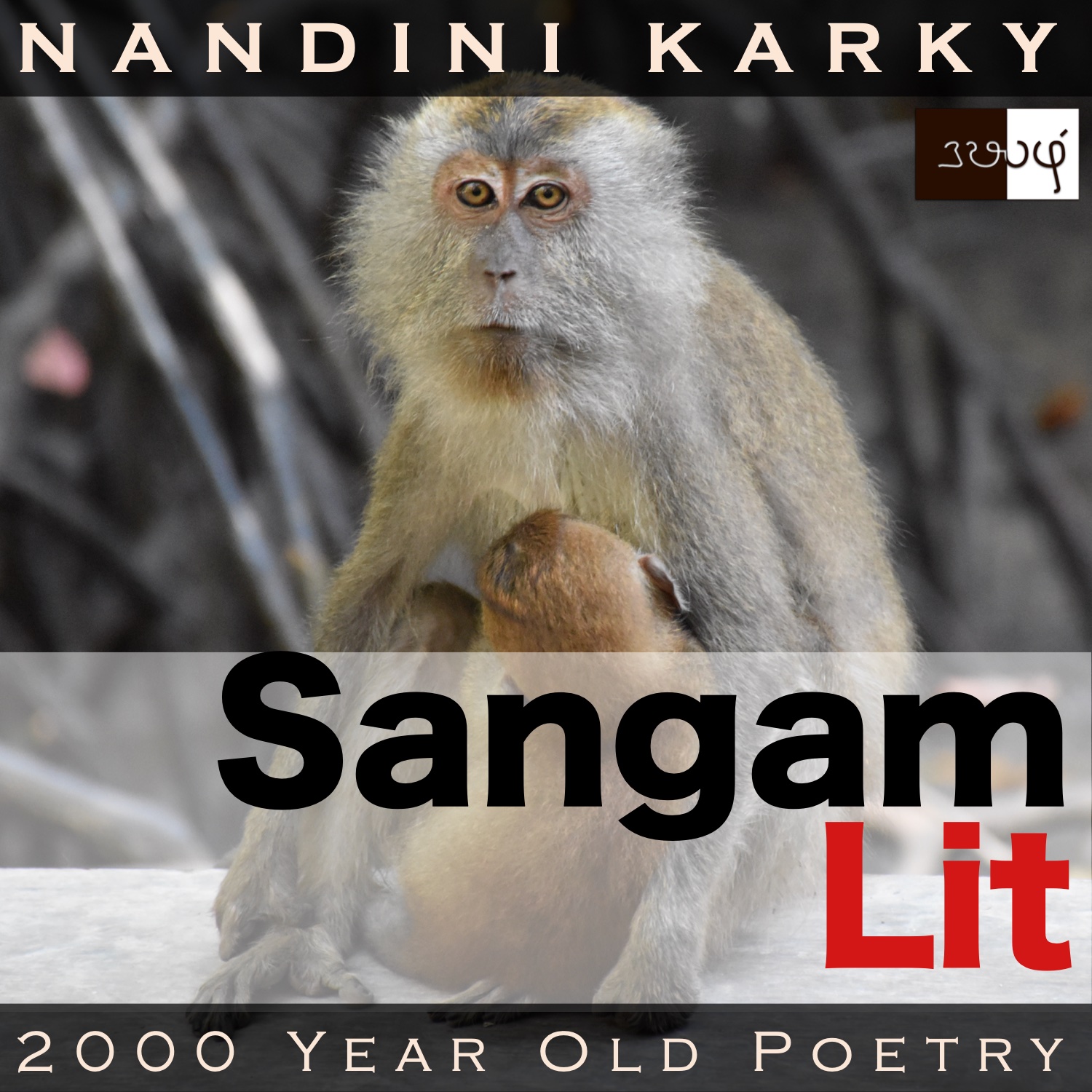Podcast: Play in new window | Download
Subscribe: Apple Podcasts | Spotify | Amazon Music | Android | iHeartRadio | TuneIn | RSS | More

In this episode, we explore the echo of human emotions in animals, as depicted in Sangam Literary work, Kurunthogai 69, penned by Kadunthotkara Veeranaar. The verse is situated in the hills of ‘Kurinji’ and speaks in the voice of the confidante to the man, subtly refusing his request for a nightly tryst.
கருங் கட் தாக் கலை பெரும் பிறிது உற்றென,
கைம்மை உய்யாக் காமர் மந்தி
கல்லா வன் பறழ் கிளைமுதல் சேர்த்தி,
ஓங்கு வரை அடுக்கத்துப் பாய்ந்து உயிர் செகுக்கும்
சாரல் நாட! நடு நாள்
வாரல்; வாழியோ! வருந்துதும் யாமே!
Loss and sadness shroud this one! The opening words, ‘கருங் கட் தாக் கலை’, meaning ‘a leaping male monkey with black eyes’, conjure before our eyes, a strong and handsome animal! ‘பெரும்பிறிது’ is a meaning-filled word for ‘death’ and throbs with the sense of a great loss. The word ‘கைம்மை’ is intricately connected with the same element, for it means ‘the state of losing one’s spouse to death’. Phrases like ‘காமர் மந்தி’ meaning ‘loveable female monkey’ and ‘கல்லா வன் பறழ்’ meaning ‘a strong monkey infant, still unskilled’ sketches for us, an entire monkey family. In the words ‘பாய்ந்து உயிர் செகுக்கும்’ meaning ‘it leaps and ends its life’, there is mention of the sad act of suicide. In the words ‘நடு நாள் வாரல்’ meaning ‘come not at night’, the core theme is embedded. Ending with the words ‘வருந்துதும் யாமே’ meaning ‘worry, we shall’, the verse invites us to listen with empathy.
Dire thoughts of death seem to be appearing here! The context reveals that the man and lady had been leading a love relationship and that the man had been trysting by day with the lady for a while. He decides to seek a nightly tryst with the lady and approaches the confidante. In reply to his request, the confidante says, “As the black-eyed, leaping male monkey passed away, unable to bear its widowhood, its loving mate, after leaving their unskilled, strong infant with their tribe, leaps from a tall peak and gives up its life. Such are the slopes of your domain, O lord! Pray do not come during the midnight hour. May you live long! Saddened, we shall be.” With these words, the confidante is persuading the man in a hidden way to seek the lady’s hand in marriage, instead of seeking nightly trysts.
What does a monkey family suffering a loss got to do with a man’s tryst? Let’s explore by following the confidante’s words closely. She starts by describing a strong male monkey with intense black eyes and conveys how this strapping animal is no more. Attributing that as the reason for the female monkey’s sadness, the confidante narrates how unable to bear this loss, the mate first leaves its young one, strong but still dependant on it, in the care of its tribe, then sets out to a peak in the mountains. Following this monkey, we learn after it’s too late that it has taken a leap of death. Concluding this scene by saying to the man that such things happen in your land, the confidante stresses strongly to him to not come there at night, for it would sadden the lady immensely!
By depicting the devastation of the female monkey after its mate’s loss, the confidante is etching in the man’s mind, the fears of the road in arriving for a tryst by night and the anxiety that arises in the lady’s mind because of that! This would hopefully nudge the man to give up such dangerous activities and set out to chart a permanent path of happiness by seeking marriage with the lady. Now, stepping aside from the verse, let’s reflect on a couple of questions this verse raises: Do animals grieve for the loss of their loved ones? Do animals give up their life willingly? The answer to the first question about animal grief, in the case of mammals, is a resounding ‘yes’. Studies show the emotional wiring of most mammals have unifying similarities. In the case of monkeys, it has been observed how many animals surround and take care of a member of the tribe, who is hurt and dying. Now, this leads to another related question about how do related family members cope with such loss? It was observed that in the case of a young monkey, which couldn’t see its mother around, the infant felt depressed and lost interest in all activities. Perhaps that’s why the mother monkey has been depicted in this verse as specifically handing over its infant in the care of other members of the tribe before it took its drastic step.
Now, we turn to the stark question of ‘do animals commit suicide’. This question seems to have fascinated philosophers for ages, starting with Aristotle around 300 BCE, until today. Up until the 19th century, it was believed that like humans, animals would willingly give up their lives. However, in recent studies, it has been discovered that the reason for such theories was not fixed in reality but an outcome of human preoccupation with these emotions and the subsequent projection on animals. However, one thing is still possible. The grieving or depressed animal is an easy prey for other animals in the wild and death may ensue in such circumstances! Truly stunning how a two-thousand-year-old verse has made us reflect on the emotions in animals. Today’s science tells us that mammals share our emotions. Maybe someday in the future, we will learn that all life feels and expresses emotion in some way, be it a swimming fish or a swaying tree. In any case, it would do the world good if we can always have that respect for all life that shares this planet with us!




Share your thoughts...